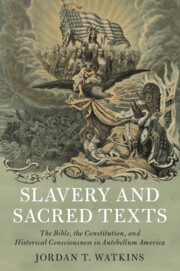 Slavery and Sacred Texts
Slavery and Sacred Texts Published online by Cambridge University Press: 12 June 2021
The conclusion summarizes the book’s central contention that antebellum interpretive debates over slavery encouraged contextual readings of sacred texts and deepened a sense of historical distance from America’s favored biblical and founding pasts. It restates the argument that while some aimed to set aside the historical distance and change their readings revealed, others used distance and change in advancing new readings of the Bible and, especially, the Constitution. The conclusion narrates how Theodore Parker, Frederick Douglass, and Abraham Lincoln continued to use historical distance and the insight of historical contingency in working towards slavery’s abolition. Douglass found hope in Lincoln’s election, the Civil War, and the Emancipation Proclamation, and despite crucial differences between them, Douglass and Lincoln continued to advance antislavery readings of the Constitution based in the framers’ expectation of abolition. This reading gave shape to Lincoln’s Proclamation and his Gettysburg Address. The conclusion also indicates the limitations of approaches like Lincoln’s and emphasizes the need today for new kinds of historical narratives and new kinds of actions.
To save this book to your Kindle, first ensure [email protected] is added to your Approved Personal Document E-mail List under your Personal Document Settings on the Manage Your Content and Devices page of your Amazon account. Then enter the ‘name’ part of your Kindle email address below. Find out more about saving to your Kindle.
Note you can select to save to either the @free.kindle.com or @kindle.com variations. ‘@free.kindle.com’ emails are free but can only be saved to your device when it is connected to wi-fi. ‘@kindle.com’ emails can be delivered even when you are not connected to wi-fi, but note that service fees apply.
Find out more about the Kindle Personal Document Service.
To save content items to your account, please confirm that you agree to abide by our usage policies. If this is the first time you use this feature, you will be asked to authorise Cambridge Core to connect with your account. Find out more about saving content to Dropbox.
To save content items to your account, please confirm that you agree to abide by our usage policies. If this is the first time you use this feature, you will be asked to authorise Cambridge Core to connect with your account. Find out more about saving content to Google Drive.